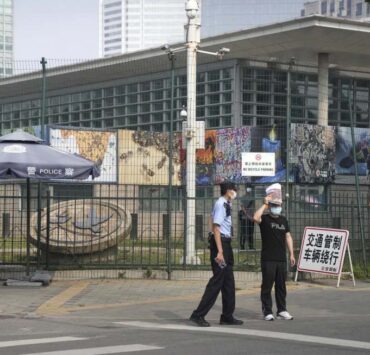Palace plays down AFP preps for China invasion of Taiwan

Malacañang on Thursday played down an order by the military chief to prepare for the evacuation of over 250,000 Filipinos workers in Taiwan in case it is invaded by China, even as the Philippine government had considered that as a “great possibility.”
Beijing has not renounced the use of force to regain control over Taiwan, which it claims to be part of its territory. Recent Chinese air and naval exercises and blockade drills around Taiwan have only heightened tensions across the Taiwan Strait, which separates China from the self-ruled island close to northern Luzon.
“This is not really new, because we’ve been talking about this even before, because of the great possibility of mainland China crossing the channel between it and Taiwan to recover Taiwan,” Executive Secretary Lucas Bersamin said in an interview.
“The Philippines has been preparing for the eventuality of an invasion. We’re not saying when that invasion will take place, whether it will take place at all,” he added. “The important thing is we are not sleeping on the job.”
On Tuesday, Armed Forces of the Philippines Chief of Staff Gen. Romeo Brawner Jr. told the Northern Luzon Command (NolCom) to be ready to lead the repatriation of overseas Filipino workers (OFWs) from Taiwan should China invade the self-ruled territory.
Meco also ready
Cheloy Garafil, chair of the Manila Economic and Cultural Office (Meco), the country’s de facto embassy in Taipei, said in a statement on Thursday that she appreciated Brawner’s directive.
“However, there is no cause for alarm because everyone here in Taiwan is conducting business as usual. Filipinos here in Taiwan are used to reports of China’s presence around the territory,” said Garafil, who also formerly headed the Presidential Communications Office (PCO).
She assured Filipinos that Meco and the Migrant Workers Office of the Department of Migrant Workers had a contingency plan “ready to be activated in any emergency situations.”
“We are also in close coordination with Taiwan authorities regarding any security concerns. But at the moment, there’s no need to worry because we are generally safe and secure here,” Garafil said.
No surprise
Following Brawner’s order to NolCom, Chinese Foreign Ministry spokesperson Guo Jiakun warned that certain people in the Philippines should not make “unfounded remarks” regarding Taiwan, as “those who play with fire will burn themselves.”
As far as Bersamin was concerned, Brawner did not mean to alarm anyone with his directive.
“Filipinos should no longer be surprised because we’ve been doing that for a long time, the preparedness for evacuations,” Bersamin said. “We are not going to war. Unless they involve us, of course.”
Jonathan Malaya, assistant director general of the National Security Council, said Brawner’s statement was intended “merely to relay to the public that the NolCom, as part of the AFP, is ready to assist our OFWs.”
He said in a press briefing at Malacañang that the Philippines had carried out similar evacuations of OFWs from the Middle East in the past.
“So, it is in that context that Brawner made that statement,” Malaya said.
‘Noncombatant evacuation’
In a statement a day after Brawner issued his order to NolCom, the AFP clarified that the military chief was only emphasizing the “non-combatant evacuation operations preparedness” to ensure the safety of OFWs in Taiwan “should the situation escalate.”
“The guidance was not a response to an imminent threat nor a declaration of heightened alert, but rather a prudent measure to ensure readiness for potential scenarios,” the AFP said.
“As a responsible military, the AFP conducts continuous strategic planning to address diverse security scenarios,” it added.

















